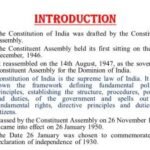CHILD FROM MARRIAGE OF MUSLIM MAN AND HINDU WOMAN LEGITIMATE, ENTITLED TO FATHER’S PROPERTY: SC

In a far reaching judgement Supreme Court(SC) ruled that child born out of a marriage between a Muslim man and a Hindu woman is a legitimate one and is entitled to a share in his father’s property.
- Though such a marriage was neither valid nor void but an “irregular” one as per Mohammedan law, the child born out of it is legitimate.
- It is clear that the marriage of a Hindu female with a Muslim male is not a regular or valid (sahih) marriage, but merely an irregular (fasid) marriage”.
- The legal effect of an irregular marriage is that in case of consummation, though the wife is entitled to get dower, she is not entitled to inherit the husband’s properties. But the child born in that marriage is legitimate just like in the case of a valid marriage, and is entitled to inherit the father’s property.”
LEARNING WITH TIMES
The original Constitution of 1950 envisaged a Supreme Court with a Chief Justice and 7 puisne Judges – leaving it to Parliament to increase this number. The Supreme Court of India comprises the Chief Justice and 30 other Judges appointed by the President of India. Supreme Court Judges retire upon attaining the age of 65 years.
In order to be appointed as a Judge of the Supreme Court, a person must be a citizen of India and must have been, for at least five years, a Judge of a High Court or of two or more such Courts in succession, or an Advocate of a High Court or of two or more such Courts in succession for at least 10 years or he must be, in the opinion of the President, a distinguished jurist.
A Judge of the Supreme Court cannot be removed from office except by an order of the President passed after an address in each House of Parliament supported by a majority of the total membership of that House and by a majority of not less than two-thirds of members present and voting, and presented to the President in the same Session for such removal on the ground of proved misbehaviour or incapacity.
The Supreme Court has original, appellate and advisory jurisdiction. Its exclusive original jurisdiction extends to any dispute between the Government of India and one or more States or between the Government of India and any State or States on one side and one or more States on the other or between two or more States, if and insofar as the dispute involves any question (whether of law or of fact) on which the existence or extent of a legal right depends. In addition, Article 32 of the Constitution gives an extensive original jurisdiction to the Supreme Court in regard to enforcement of Fundamental Rights.
The appellate jurisdiction of the Supreme Court can be invoked by a certificate granted by the High Court concerned under Article 132(1), 133(1) or 134 of the Constitution in respect of any judgement, decree or final order of a High Court in both civil and criminal cases, involving substantial questions of law as to the interpretation of the Constitution. Appeals also lie to the Supreme Court in civil matters if the High Court concerned certifies : (a) that the case involves a substantial question of law of general importance, and (b) that, in the opinion of the High Court, the said question needs to be decided by the Supreme Court. In criminal cases, an appeal lies to the Supreme Court if the High Court (a) has on appeal reversed an order of acquittal of an accused person and sentenced him to death or to imprisonment for life or for a period of not less than 10 years, or (b) has withdrawn for trial before itself any case from any Court subordinate to its authority and has in such trial convicted the accused and sentenced him to death or to imprisonment for life or for a period of not less than 10 years, or (c) certified that the case is a fit one for appeal to the Supreme Court. Parliament is authorised to confer on the Supreme Court any further powers to entertain and hear appeals from any judgement, final order or sentence in a criminal proceeding of a High Court.
The Supreme Court has special advisory jurisdiction in matters which may specifically be referred to it by the President of India under Article 143 of the Constitution. Under Articles 129 and 142 of the Constitution the Supreme Court has been vested with power to punish for contempt of Court including the power to punish for contempt of itself.




0 Comments